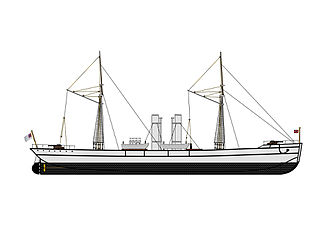
The CSS Tallahassee was a twin-screw steamer and cruiser in the Confederate States Navy, purchased in 1864, and used for commerce raiding off the Atlantic coast. She later operated under the names CSS Olustee and CSS Chameleon.

Pet No. 9 was a pilot boat used by the New York Sandy Hook Pilots in the 19th century. The schooner was used to pilot vessels to and from the Port of New York and New Jersey.

The Sylph was a 19th-century pilot boat first built in 1834, by Whitmore & Holbrook for John Perkins Cushing as a Boston yacht and pilot-boat for merchant and ship owner Robert Bennet Forbes. She won the first recorded American yacht race in 1835. She was a pilot boat in the Boston Harbor in 1836 and 1837 and sold to the New York and Sandy Hook Pilots in October 1837. She was lost in winter of 1857 with all hands during a blizzard off Barnegat, New Jersey. The second Sylph was built in 1865 from a half-model by Dennison J. Lawlor. The third Sylph was built in 1878 at North Weymouth, Massachusetts for Boston Pilots. She was sold out of service in 1901, after 23 years of Boston pilot service.

James H. Reid, was a 19th-century American Maritime pilot. He is best known for being the dean of the Boston pilots, serving for 55 years. He was captain of the famous yacht America for 17 years when she was owned by Benjamin F. Butler. In 1897, he built a new America, named after the America's Cup defender.
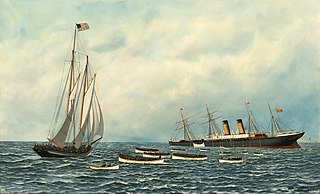
The Phantom was a 19th-century Sandy Hook pilot boat built in 1867 from the designs by Dennison J. Lawlor. The schooner was considered a model for her type with a reputation for being very fast. She helped rescue the passengers on the steamship SS Oregon when it sank in 1886. She was one of the pilot-boats that was lost in the Great Blizzard of 1888. The Phantom was replaced by the pilot-boat William H. Bateman.

The D. J. Lawlor was a 19th-century Boston pilot boat built in 1881 at North Weymouth, Massachusetts. The schooner was considered the largest for her type, noted for her seaworthiness and heavy weather performance. She was named after the prominent Boston shipbuilder Dennison J. Lawlor. She was struck by a fishing schooner Horace B. Parker, in 1895, and was replaced by the pilot-boat Liberty in 1896.
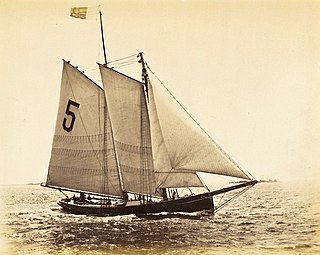
The Hesper was a 19th-century Boston pilot boat built in 1884, designed from a model by Dennison J. Lawlor as a Boston yacht and pilot-boat for merchant and ship owner George W. Lawler. She was known to be the largest pilot boat under the American flag at 104 feet long and the fastest of the Boston fleet. She competed in several first-class sailing races, and in 1886, the Hesper won the silver cup in what was known as the first Fishermen's Race. She was withdrawn from the pilot service and sold in 1901. The Hesper became a wreck on the point off Cape Henlopen in 1919.

Thomas Francis McManus was a fish merchant who became a naval architect, responsible for introducing the shortened bowsprit and long stern overhang to give speed to his vessels. He was well known for revolutionizing the Gloucester fishing schooner. He made the fastest vessels of their type in the world and was honored on two continents for his skill as a naval architect. He became known as the "Father of the Fishermen's Races." 500 fishing schooners used his designs to improve speed. He was a friend of Sir Thomas Lipton and President Theodore Roosevelt.
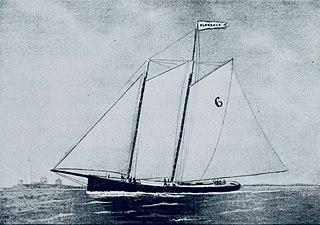
Florence was a 19th-century Boston pilot boat built in 1867 from a model by Dennison J. Lawlor for William C. Fowler. The vessel had a reputation for being fast under sail. She had a long career in the Boston service, skippered by many famous pilots. She was the oldest pilot-boat in the service. In 1897, she was sold to a Portland, Maine group for fishing and yachting excursions. The pilot boat America, No. 1, was launched on April 19, 1897, to replace the Florence.
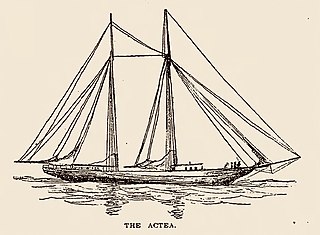
The Actaea, or Actea, was a 19th-century Boston yacht built in 1880 by Weld and David Clark of Kennebunk, Maine for David Sears, Jr., of Montgomery Sears of Boston. She was purchased by a group of New York Sandy Hook Pilots in 1890. She was one of the largest and fastest pilot boats in the fleet. In the age of steam, the Actaea was sold in 1896 to John J. Phelps of the New York Yacht Club and used as a pleasure yacht.

George W. Lawler, was a 19th-century American Boston Maritime pilot. He is best known for being with the Boston pilot service for over 40 years. He was captain of the famous pilot boats Lillie, and Hesper.

William C. Fowler, was a 19th-century American Boston maritime pilot. He is best known for being the oldest pilot in the pilot service having served for fifty years as a branch pilot. He was captain and owner of the pilot boat Florence. His nephew, Franklin Fowler was a well known Boston pilot.
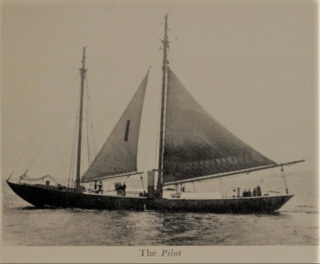
The Pilot was a pilot boat built in 1924 and designed by yacht designer William Starling Burgess. She was purchased by the Boston Pilots' Association to take the place of the pilot boat Louise that was withdrawn from service in 1924. The Pilot was in service for over fifty years before she was sold in 1976. She became the longest-serving pilot boat in American history.
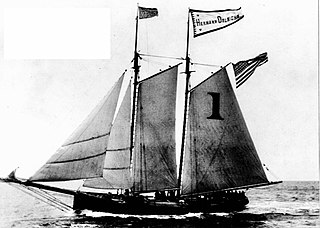
The Hermann Oelrichs was a 19th-century Sandy Hook Pilot boat, built in 1894 by Moses Adams at Essex, Massachusetts for a group of New York Pilots. She helped transport New York City maritime pilots between inbound or outbound ships coming into the New York Harbor. The Herman Oelrichs was said to be the fastest of the New York pilot fleet. She was built to replace the pilot boat Hope, that was wrecked in 1890.
Dennison J. Lawlor, was a 19th-century Canadian-Irish shipbuilder and yacht designer. He apprenticed under shipbuilder Whitmore & Holbrook. Lawlor had his own shipyard, building and designing for 40 years some of the finest yachts, pilot boats, and 150 merchant vessels built from his designs. The most notable were the Hesper, Florence, and D. J. Lawlor. Lawlor died in Chelsea, Massachusetts in 1892.

The Coquette was a 19th-century yacht and pilot boat, built in 1845 by Louis Winde, at the Winde & Clinkard shipyard in Chelsea, Massachusetts for yachtsmen James A. Perkins. Her design was based on a model by shipbuilder Dennison J. Lawlor. The Coquette was a good example of an early American yacht with a clipper bow. As a yacht, she won the attention for outsailing the larger New York yacht Maria at the second New York Yacht Club regatta in 1846. Perkins sold the Coquette to the Boston Pilots' Association for pilot service in 1848. She continued as a pilot boat until 1867 when she was sold as a Blackbirder to be used on the African coast.

The Gracie was a 19th-century racing sloop yacht built in 1868 by James E. Smith shipyard at Nyack, New York. She raced the America's Cup defender Mischief in the trails off Sandy Hook in 1881. Gracie raced at the New York Yacht Club, Atlantic Yacht Club and other eastern yacht clubs. After a 42-year career in racing, she was sold in 1909 and converted to a freight boat sailing from Milton Point, off Long Island to New York.

Moses Adams, was a 19th-century prominent Essex shipbuilder. He had his own shipyard and built eighty-five schooners and pilot boats. Adams died in Essex, Massachusetts in 1894.

Edward A. Costigan, was a 19th-century Boston, Massachusetts shipbuilder. In 1858, he founded the E. A. Costigan shipyard at Commercial Street in Boston, where he built many notable pilot boats and scows. He was one of the oldest of Boston shipbuilders, being connected with shipbuilding most of his life. Costigan died in Boston in 1901.


















